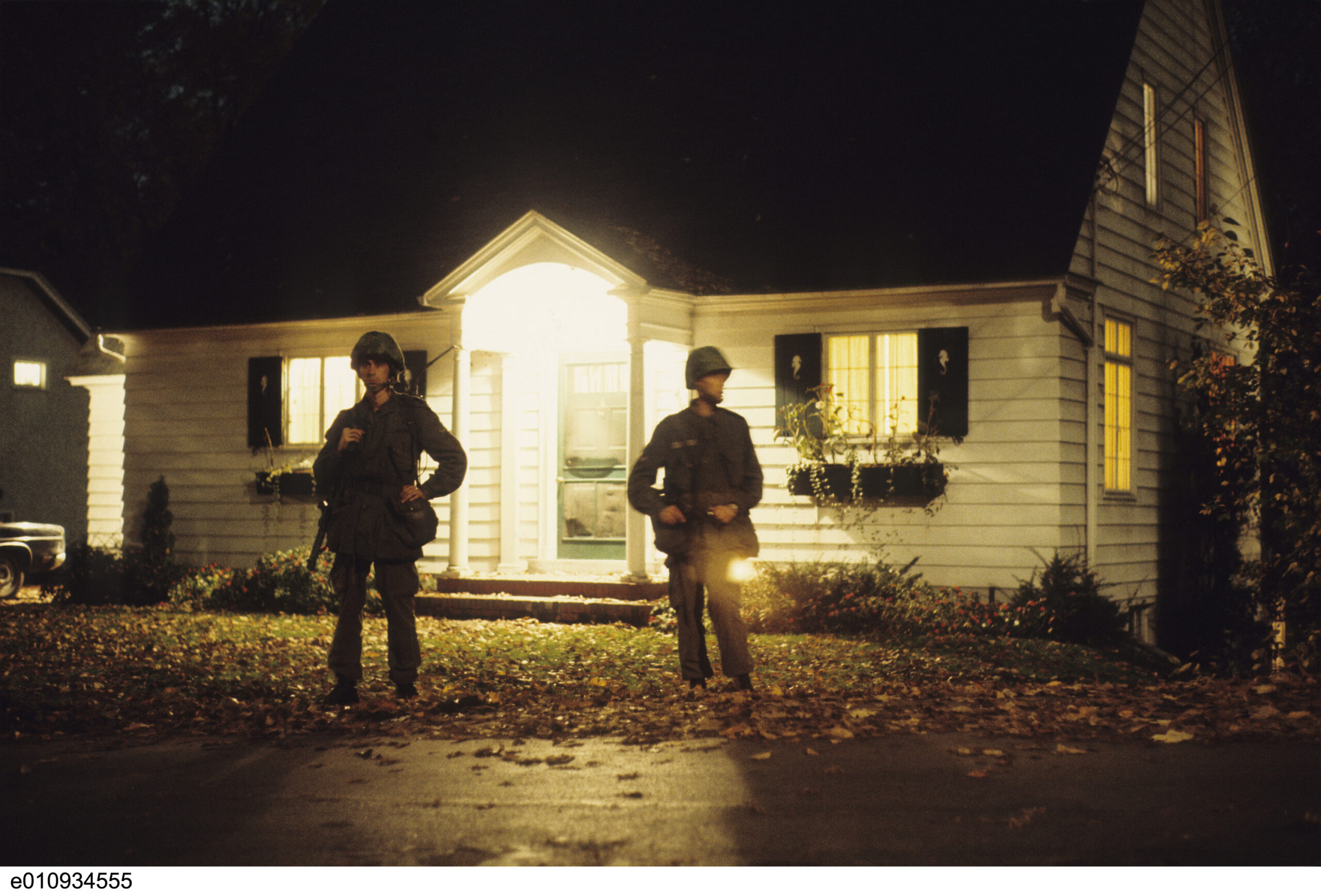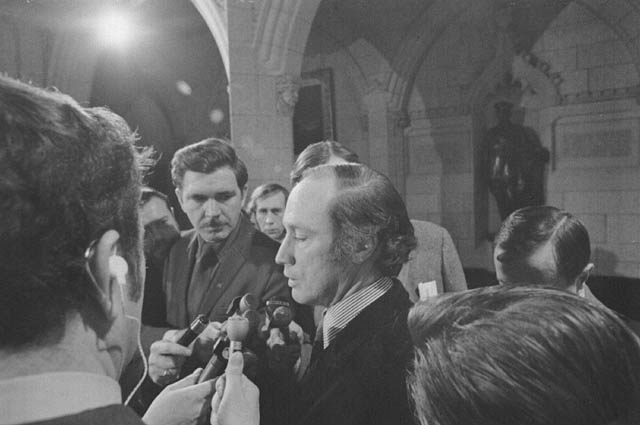The abrogation of due process and limits on freedom of the press were not the only restrictions imposed under the emergency legislation. In Ottawa, where soldiers lined the streets, the Quebec Provincial Police raided the home of a woman who had been photographed at a demonstration to protest the imposition of the War Measures Act. A Toronto school board considered a motion to ban teachers from speaking about the FLQ in their classrooms. Seven members of the Vancouver Liberation Front, a fringe group that was sympathetic to the aims of the FLQ, were arrested and detained for distributing copies of the FLQ Manifesto in Vancouver. In Montreal, Mayor Jean Drapeau did himself little credit by using cheap smear tactics in his re-election bid. Refusing to delay the municipal elections, he allowed them to take place in the midst of the crisis and accused his opponents, members of the Front d’action politique, of being FLQ puppets. Jean Marchand echoed his comments, although neither had any evidence to link the Front d’action politique with terrorist activity. Drapeau won a landslide victory on 25 October.
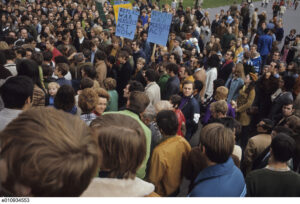
The most flagrant overreaction occurred far from the crisis itself, in Vancouver. In a perplexing moment of extremism, Premier W.A.C. Bennett declared that his cabinet had approved a regulation banning any BC teachers, including college and university professors, from expressing sympathy with the FLQ. His Order-in-Council of 2 November 1970 proclaimed that “no person teaching or instructing our youth in educational institutions receiving Government support shall continue in the employment of the educational institution if they advocate the policies of the [FLQ].” The order did not specify what constituted a policy of the FLQ. Moreover, the threat of dismissal alone was a direct limit on teachers’ free speech, and at least one of them, a high school teacher in Dawson, was dismissed for discussing the FLQ in his classroom.Not to be outdone by Bennett, the acerbic mayor of Vancouver, Tom Campbell, shamelessly exploited the situation and announced that he would use the emergency powers to run hippies and draft dodgers out of town. Campbell never acted on his threat, but his rhetoric raised the ire of even those who supported the use of the War Measures Act. The conservative Vancouver Sun, no friend to hippies or draft dodgers, was disgusted with the mayor’s antics and suggested that “the least responsible reaction to be found anywhere in Canada was that of Vancouver’s own mayor … His personal politicking with such a sad affair can only be described as damnable.” [20 October 1970]
Ongoing apprehension led to talk about imposing additional limits on human rights. Jérôme Choquette, Quebec minister of justice, expressed support in early November for the creation of a Canadian identity card (he also asked Ottawa to revoke the citizenship of any FLQ prisoners who were deported during the crisis). Meanwhile, the federal solicitor general, Jean-Pierre Goyer, mused about the possibility of enacting peacetime emergency legislation to allow the government to act quickly and decisively in any future crisis. Although neither idea came to fruition, both suggestions were indicative of an atmosphere in which human rights had taken second place to national security concerns.
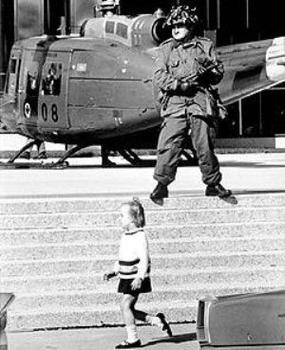
The crisis lasted approximately two months. Cross was released on 3 December, and his kidnappers were flown to Cuba, whereas Laporte’s killers were captured on 27 December and sent to jail (by 1982, however, most of the exiles and prisoners were back on the streets of Quebec, having been granted parole or a reduced sentence). The army left Quebec in January 1971, and the emergency powers lapsed on 30 April of that year. The October Crisis marked the end of violent revolutionary protest in the province.
A CTV poll released on 15 November 1970 indicated that 87 percent of Canadians approved the invocation of the War Measures Act (only 5 percent were explicitly opposed). Several other opinion polls released in 1971 reaffirmed support in Quebec and the rest of Canada for Ottawa’s tactics. The media were divided but largely sympathetic, especially in English Canada. Frank Scott and other notable civil libertarians publicly endorsed the use of emergency powers. Of the twelve thousand letters sent to Trudeau regarding the crisis, barely 2 percent were critical of his actions. Claude Ryan, the influential editor of Le Devoir, was dismayed at the uncritical support that Trudeau enjoyed outside Quebec: “One had the impression that, but for a few voices crying in the wilderness, all critical reflection had practically ceased in English Canada.” [Le Devoir, 1 February 1971, translated by author]
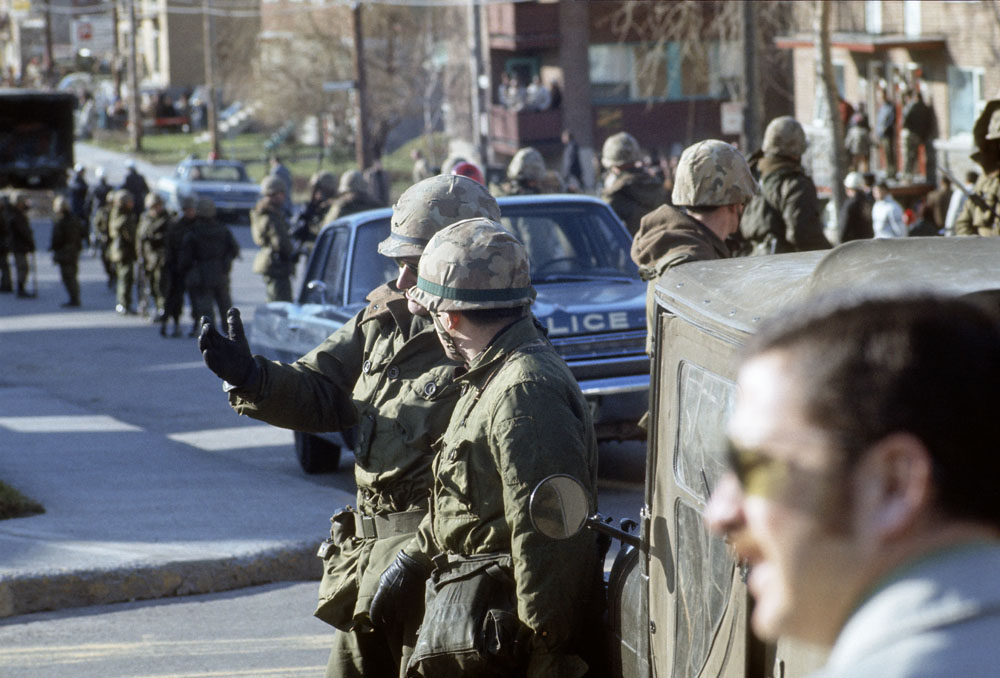
Further Reading
- The Further Reading link on the right will bring you to a comprehensive list of readings on this topic. For some initial readings, see:
- Clément, Dominique. Canada’s Rights Revolution: Social Movements and Social Change, 1937-82. Vancouver: UBC Press, 2008, Chapter 5.
- Clément, Dominique. “The October Crisis of 1970: Human Rights Abuses under the War Measures Act.” Journal of Canadian Studies 42, 2 (2008): 160-86.
- Cohen-Almagor, Raphael. “The Terrorists’ Best Ally: The Quebec Media Coverage of the FLQ Crisis in October 1970.” Canadian Journal of Communication 2 (2000): 251-284.
- Lachapelle, Guy. Claude Ryan et la violence du pouvoir: Le Devoir et la Crise d’octobre 1970 ou le combat de journalistes démocrates. Sainte-Foy: Presses de l’Université Laval, 2005.
Research Sources
Archives and Collections
- Library and Archives Canada: Cabinet Documents on the October Crisis
- Library and Archives Canada: Pierre Trudeau Papers
- Library and Archives Canada: Strategic Operations Centre
- McMaster University Archives and Research Collections: FLQ Printed Materials Collection
Films and TV
- CBC Podcast: How to Start a Revolution
- Action: The October Crisis of 1970, directed by Robin Spry
- Black October, directed by Terence McKenna
- Les événements d’octobre, 1970, directed by Robin Spry
- October 1970, a 2010 CBC mini-series
- Les ordres, directed by Michel Brault
- Reaction: A Portrait of a Society in Crisis, directed by Robin Spry

